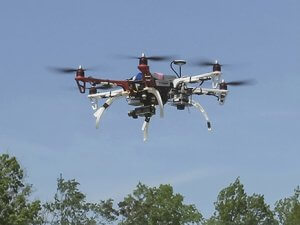
Drone technology will be used for data collection, and to aid in the research by developing datasets that can be used for machine learning, object detection, and counting.
Five students from Atlantic Cape Community College will be joining researchers from Rowan University to investigate potential improvements to artificial intelligence and machine learning algorithms—with the goal of further developing these technologies to learn from and adapt to a perpetually changing environment.
From connected and autonomous vehicles to smart cities, Artificial Intelligence (AI) and machine learning are at the forefront of modern technology—not only in transportation—but a variety of fields such as healthcare, security, and environmental sciences among others.
But, before this technology can grow and be implemented on a larger scale, one barrier it must overcome is trustworthiness. Most AI systems currently are unable to build prediction capabilities outside of previous training and therefore struggle to adapt to new environments. This results in the need for continuous maintenance and tuning in order to keep these systems up to date and usable.
A new, $500,000 National Science Foundation (NSF) project, “Self-Assessment and Continual Learning on Edge Devices (SCenE),” aims to address these problems and the larger goal of examining ways to improve artificial intelligence systems and machine learning algorithms that lie at the heart of modern technology.
University Transportation Center (UTC) partners at Rowan University, Dr. Ghulam Rasool, assistant professor of Electrical & Computer Engineering, and Dr. Nidhal C. Bouaynaya, professor of Electrical & Computer Engineering and associate dean for research and graduate programs for the Henry M. Rowan College of Engineering, are leading the project. According to Rowan Today, the researchers are working to develop a rigorous, scalable learning framework that will enable AI systems to self-assess their performance and continually expand upon their prior knowledge.
“For a system to be truly ‘intelligent,’ it must feature learning frameworks that are aware of their own limitations, have an expandable knowledge base that can successfully address failures after deployment, and have capabilities to operate in a continuous and dynamic real-world environment,” Dr. Rasool said to Rowan Today.
Joining them on this research will be five students from fellow UTC partners at Atlantic Cape Community College’s Drone and Aviation Department. According to a news release from Atlantic Cape, the students will help Rowan by piloting drones equipped with high definition cameras to collect geographically referenced images of Atlantic horseshoe crabs, cranberries, and blueberries.
With this data collection, the overall goal is to aid in the research by developing datasets that can be used for machine learning, object detection, and counting, officials said.
Drone technology spans various industries and is a rapidly growing field. According to the Association for Unmanned Vehicle Systems International (AUVSI) in 2013 it was estimated that drone-based businesses would generate $82.1 billion in economic impact between 2015 and 2025. The organization also estimated that New Jersey would see approximately $1.6 billion of that, along with 2,000 drone-related jobs in the state over those 10 years.
At the forefront of this technology, both Atlantic Cape and the Center for Advanced Infrastructure and Transportation (CAIT) have been making investments. Notably, Atlantic Cape recently launched its Applied Science for Unmanned Aircraft Systems Field Technicians degree and a series of micro-credentials that stack into it.
The degree program is helping students enter the multi-billion-dollar drone industry through these classes and credentials, as well as by working to establish the college’s drone-pilot certification program as the industry standard.
When it comes to AI and machine learning, researchers all agreed that this project has the potential to improve smart technologies such as intelligent transportation systems, public transportation, severe weather and flood monitoring, aviation and rotorcraft safety, agriculture, vegetation, endangered species monitoring, healthcare, and smart and connected communities.
“We’re honored and excited for our students to be a part of this innovative and unique project” said James Taggart, a professor in the Information Systems and Aviation Studies Department, in the Atlantic Cape news release. “Drone technology is revolutionizing the way industries view the world, similar to AI, but unique in its own way. We’re proud that the researchers and engineers at Rowan recognize and facilitated a partnership with us for the project.”

